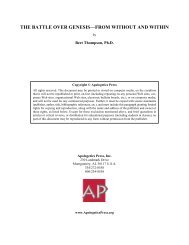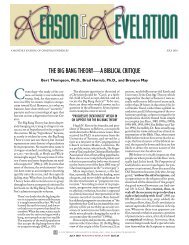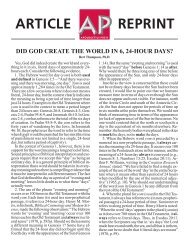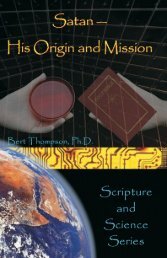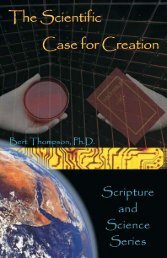The Many Faces, and Causes, of Unbelief - Apologetics Press
The Many Faces, and Causes, of Unbelief - Apologetics Press
The Many Faces, and Causes, of Unbelief - Apologetics Press
You also want an ePaper? Increase the reach of your titles
YUMPU automatically turns print PDFs into web optimized ePapers that Google loves.
4<br />
CONCLUSION<br />
Every person familiar with the Bible is aware <strong>of</strong> one <strong>of</strong> its<br />
central themes—the evil results <strong>of</strong> unbelief. Throughout the<br />
Bible, Heaven’s warning was that belief (<strong>and</strong> its accompanying<br />
faithfulness) would bring spiritual life <strong>and</strong> God’s blessings,<br />
while unbelief (<strong>and</strong> its accompanying unfaithfulness)<br />
would bring God’s wrath <strong>and</strong> spiritual death. <strong>The</strong> prophet<br />
Ezekiel spoke <strong>of</strong> the man who “turneth away from righteousness<br />
<strong>and</strong> comitteth iniquity, <strong>and</strong> dieth therein” as being one<br />
who “in his iniquity...shall die” (18:26). <strong>The</strong> apostle Paul observed<br />
that the Old Testament was “schoolmaster” (Galatians<br />
3:24) <strong>and</strong> as such had been penned “for our learning” (Romans<br />
15:4). It should come as no surprise, then, to see Paul catalog<br />
in 1 Corinthians 10 a number <strong>of</strong> instances <strong>of</strong> apostasy—as a<br />
warning to those who might be thinking about following in<br />
the footsteps <strong>of</strong> their unbelieving predecessors.<br />
All too <strong>of</strong>ten man’s “wisdom” has replaced God’s (see 1<br />
Corinthians 1:18-25), causing many to lose their way in what<br />
has become one <strong>of</strong> the most horrible, <strong>and</strong> yet one <strong>of</strong> the most<br />
common, tragedies <strong>of</strong> our day. <strong>The</strong> price humans have paid<br />
for being intellectually learned but spiritually ignorant—the<br />
loss <strong>of</strong> their own souls—has been far higher than we ever could<br />
have imagined.<br />
In the New Testament book <strong>of</strong> Mark, there is an intriguing<br />
comment about the Lord. <strong>The</strong> text states simply: “And he<br />
could there do no mighty work,...<strong>and</strong> he marvelled because<br />
<strong>of</strong> their unbelief” (6:5-6). What is the meaning <strong>of</strong> this statement?<br />
- 119



